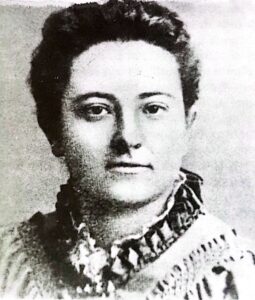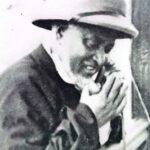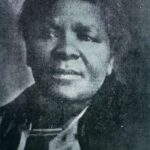SCHREINER, OLIVE
- 3 Min Read
Olive Schreiner (March 24, 1855 – December 11, 1920) is best known, both within and outside South Africa, for her novel The Story of an African Farm, though she was also an allegorist, pacifist, political campaigner, and polemicist on the position of women and Africans.

PHOTO CAPTION: Schreiner Olive. SOURCE: Britannica.
She was born the ninth of 12 children at Wittebergen, Cape Colony, on a Wesleyan mission station at the edge of Basutoland [now Lesotho]. At the age of nine she experienced a profound crisis of faith, described in her adult letters with the characteristically moral anguish of the 19th century freethinker.
When she was 12, the family dispersed, and she lived first with a brother and sister at the diamond fields, New Rush (later Kimberley). She then worked as a governess for seven years in the isolated villages of the Cape interior.
Her novel, The Story of an African Farm, was completed in 1880, and by this time she had saved enough money to sail for England in hopes of finding a publisher for the novel. The development of her literary talent is hard to account for, though it is known that she had great regard for the literary style of the Bible and the ideas of Herbert Spencer. Schreiner was an avid reader as a child, devouring the works of Goethe, Darwin and Gibbon among others.
The Story of an African Farm, published under the male pseudonym of Ralph Iron by Chapman and Hall in London in 1883, brought her instant celebrity, and in many quarters notoriety. Despite the novel’s loose structure, its central theme is clearly that of a woman’s striving for independence in work and love. She moved in radical and freethinking circles, but did not publish further while in England, in part because of poor health (she was asthmatic).
She returned to Africa in 1889, and within six years had married and given birth to a daughter who died at birth, undeniably the greatest loss of her life. Externally her central preoccupation was now the political and economic changes taking place in South Africa, and in particular the impact of the policies of Cecil John Rhodes.
She became an implacable opponent of Rhodes, and her short book Trooper Peter Halket of Mashonaland (1897) uses an allegorical style to lambast Rhodes’s imperial ambitions, and what she saw as his indifference to human suffering. In the Boer War she took the Boers’ side, organizing on their behalf, and for a time living under martial law; she was later in contact with the satyagraha movement of Mahatma Gandhi.
She spent the years after the Boer War writing a book on the domestic enslavement of the contemporary woman of leisure, which was published in Britain as Woman and Labour (1911). “We take all labor for our province” was its refrain, and it became the rallying call for a generation of women. A novel about prostitution inside and outside marriage, From Man to Man, was published posthumously.
Olive Schreiner’s career is often seen as peaking with The Story of an African Farm, and then declining. In fact, with the exception of the novel about prostitution which she wrote and rewrote for 30 years, she maintained a steady output throughout her life. She is also acknowledged as one of the earliest commentators on South Africa to stress the centrality of the “native question” in any permanent solution to South Africa’s problems. Schreiner’s was truly an authentic, indigenous South African voice, which spoke for liberation on many level , while condemning the wanton violence and inhumanity of the imperial mission.
ANN SCOTT





